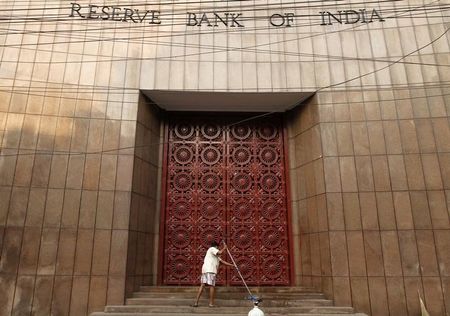By Neha Dasgupta and Devidutta Tripathy
MUMBAI (Reuters) - India raised the minimum capital requirement for so-called shadow banks and tightened rules on deposits and bad loans to avoid any potential risk to the economy from these rapidly growing finance firms by regulating them like traditional banks.
Shadow banks, or non-banking financial companies (NBFCs), have in recent years played a bigger role in financing small businesses and individuals in India, taking over from the banks that reined in credit as economic growth slowed.
On Monday, the Reserve Bank of India (RBI) said these companies were now so entrenched in the financial system that they needed better regulation.
Assets of shadow banks, which include Capital First Ltd, Mahindra & Mahindra Financial Services Ltd and LIC Housing Finance Ltd, rose to 12.5 percent of GDP last year from 8.4 percent in 2006, RBI data shows.
"They are as exposed to risks arising out of counterparty failures, funding and asset concentration, interest rate movement and risks pertaining to liquidity and solvency, as any other financial sector player," the RBI said in a statement.
There are some 12,000 NBFCs registered with the RBI, and like traditional banks, they offer loans. Some take deposits.
Analysts and financing company executives said the new RBI rules on what constitutes a bad loan would reduce the sectors' ability to lend to small companies which have trouble getting credit from big banks because they are considered risky.
Currently, the NBFCs consider a loan bad if it has not been paid for 180 days after it is due, but the new rules cut that timeframe by half, in line with the regulations for banks. The new rules will fully take effect after March 2018.
"You know in an emerging economy like ours where we've got 40 percent of our small businesses not getting adequate credit, I don't understand why we are talking of this global standards before we cater to all of them," G.S. Sundararajan, group director at Shriram Group, which owns two of India's leading non-banking financial firms, told Reuters.
As part of the new rules, the RBI said non-banking firms must raise their core capital requirements to at least 10 million rupees ($162,668)(102,668 pound) by March 2016 and 20 million rupees by end-March 2017, from 2.5 million rupees now.

Only certain investment-grade non-banking firms would be allowed to take deposits and the companies will have until March 2016 to acquire a credit rating. The RBI also capped deposit-taking at 1.5 times the size of a firm's minimum capital, down from four times previously.
(Writing by Sumeet Chatterjee; Editing by Rafael Nam and Clara Ferreira Marques and Miral Fahmy)
